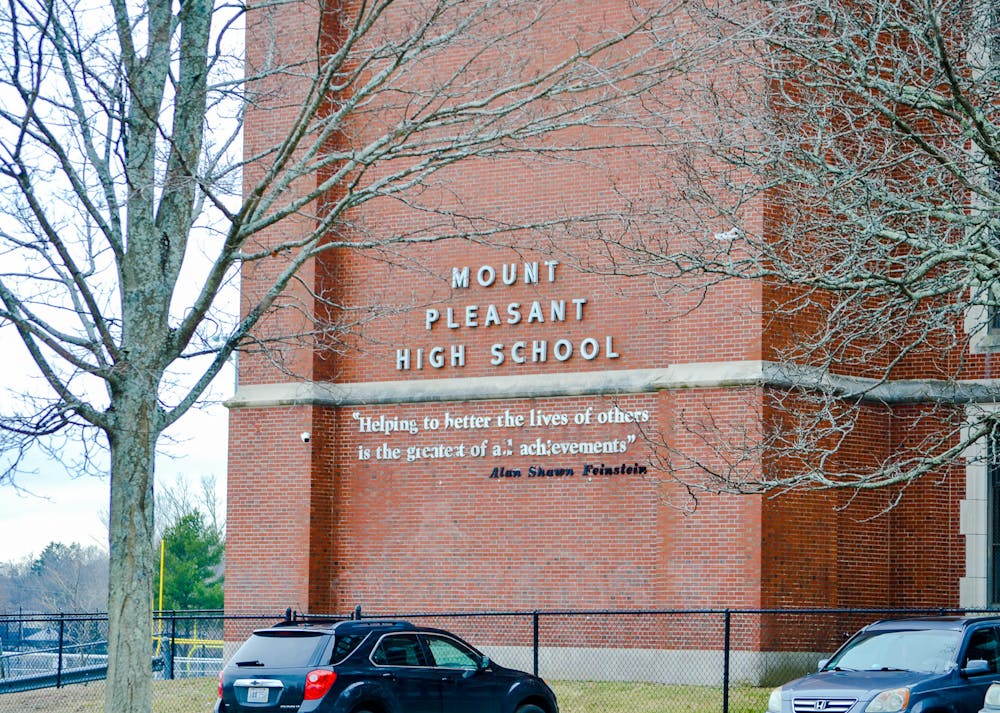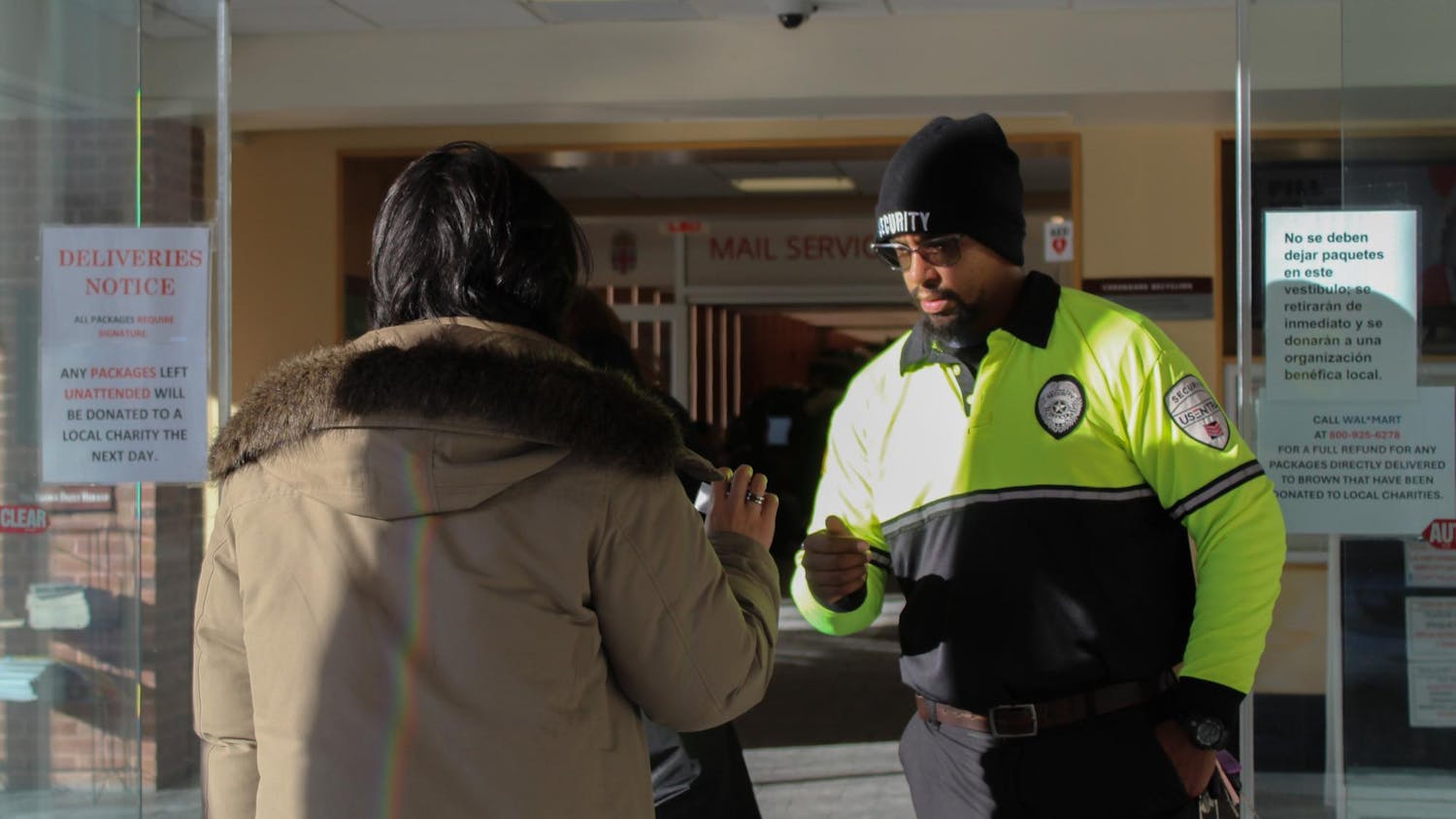A school resource officer allegedly physically assaulted 16-year-old Mount Pleasant high school student Jay-Juan Guillen-Watson Feb. 1, according to a live video posted on Facebook by the boy’s mother, Evelyn Guillen Rincón.
In the video, Rincón said she learned of the assault when a fellow student video-called her around 3 p.m. She said she saw a police officer on the video “choking” her son and that he “was vomiting on himself and spitting up blood.” She immediately drove to the school, but, by the time she arrived, her son had already been transferred to the police station, she said. She added that she received no calls from Mount Pleasant High School before the transfer occurred.
Rhode Island State Senator Sam Bell, a Democrat representing Providence, said to The Herald that he was “obviously horrified” upon hearing about the assault but “not particularly surprised.”
In a letter written by community organizations and state politicians to Gov. Dan McKee Feb. 14 imploring him to remove SROs from Providence Public School District, Bell wrote “ever since I saw a cop knee a fellow student in her crotch repeatedly in middle school, I’ve felt we shouldn’t have SROs in our schools.”
Although Bell doesn’t “pretend to know the context about that instance,” he nevertheless expressed that the incident forever changed his perspective on police presence within schools.
“It sticks with you,” Bell said.
McKee did not respond to a request for comment.
Representative David Morales MPA’19, a Democrat representing Providence, also signed the letter, writing that “it is time we begin to adequately fund mental health resources and remove school resource officers from Providence Public Schools.” Only then, Morales said, “will we be taking the active steps to close the school-to-prison pipeline and intentionally support the needs of our youth, particularly youth of color.”
Morales agreed with Bell about the atrocity of the assault, and told The Herald that “regardless of what offense was committed, there was no reason for that police officer to act in such an aggressive, forceful manner.”
Morales added that he has personal experience with SROs from growing up in a “low-income community” in Soledad, California. “I’ve always been against having school resource officers in public schools ever since I was in high school,” he said. “This has been a lifelong value for me.”
“One thing I remember is feeling uncomfortable being a young person of color and being in an environment where there was a level of law enforcement that I would expect to see on the street but not necessarily in the hallways of my school,” Morales added.
The letter Bell and Morales contributed to was signed by 24 community organizations and many state representatives, community organizers and other politicians. Twenty community organizations also signed a separate letter to the governor and Angélica Infante-Green, R.I. commissioner of elementary and secondary education, that was published Feb. 11. Infante-Green did not respond to a request for comment.
Community organizations, student groups comment on assault
Since Guillen-Watson’s arrest, several community organizations have advocated for removing SROs from schools.
Brown’s Students for Educational Equity was among the 24 student groups and organizations that signed the Feb. 14 letter to the governor.
“A lot of (SEE representatives) were really horrified that something could happen at a school, where students are supposed to be safe and protected,” said Zoe Fuad ’23.5, co-president of SEE. “And not only that the incident itself happened but that the guardians were not at all notified, and that over five hours later there was no information given and that everything broke Mount Pleasant’s own rules.”
“The fact that (Rincón) had to livestream her own reaction in order to get any kind of response is really terrifying,” Fuad added.
Eliminating SROs, she said, ranks high on SEE’s list of priorities. SEE became involved with the Providence Student Union’s “Counselors Not Cops” campaign in 2020.
The group, she added, is focused on “uplifting the voices” of PPSD students and organizers as opposed to inserting its own opinions.“SEE has always worked from and with the community,” Fuad said. “We’re going to get behind what all of our community partners are advocating for, what our community partners know is going to be right for the students of Providence.”
Jennifer Wood, executive director of the Rhode Island Center for Justice, emphasized that youth-led organizations are, and should be, at the center of this work.
“The Rhode Island Center for Justice works with student organizations who have been advocating for the removal of police from the Providence public schools, typically through the (Providence Alliance for Student Safety) Coalition,” Wood said. “We stand in solidarity with their position that police make schools less safe, not more safe.”
The PASS coalition, founded in 2019, has fought to remove SROs from PPSD since its inception, including by organizing the “Counselors Not Cops” campaign and the PASS Plan for Public Safety, released in June 2021, The Herald previously reported.
The diverse array of community groups that signed the letter is impressive, according to Samy Amkieh ’21.5 MPH ’23, former Brown Refugee Youth Tutoring and Enrichment coordinator and former co-chair of Providence Democratic Socialists of America’s Defund the Police, Reimagine Safety, Invest in Providence Working Group.
“There’s been a huge outpouring of support from places that wouldn’t necessarily come to mind right away but make a lot of sense,” Amkieh said.
For example, many arts and culture-focused organizations such as Urban Arts and Providence ¡CityArts for Youth! signed the letter. These organizations “understand that the sacrifice of kids' enrichment beyond the classroom is at the hands of money spent on policing,” Amkieh said. “You can’t try to uplift and educate and enrich youth and also have these structures in place that criminalize them.”
Controversy of SROs
The problems surrounding SROs in schools are rooted in a fundamental disconnect between police training and their actual responsibilities, Bell explained.
“Police officers are frequently asked to do things they are simply not qualified to do,” such as dealing with mental health, addiction crises and solving crimes, he said.
“It’s a difficult job, it’s an important job and it’s a job people really have to be trained for,” Bell said. “And police officers are just not equipped.”
“They’re given excessive authority and a lack of training,” Bell noted, “and together those things result in deeply problematic outcomes.”
Harrison Tuttle, executive director of the Black Lives Matter R.I. Political Action Committee, emphasized the need to raise teachers’ salaries and hire “a diverse set of teachers that reflect the student body” in addition to bringing more mental health specialists and counselors into schools.
77% of teachers in PPSD identify as white while 6.5% of students in Providence public schools are white.
“It’s disappointing that we can’t focus our efforts on things like that,” Tuttle said of greater investments in hiring and maintaining racially representative teachers, counselors and mental health specialists.
“We don’t see police officers in other school districts that are wealthier,” Tuttle added. “This really disproportionately affects Black and brown folks, (which) ultimately creates and furthers the school-to-prison pipeline.”
Bell acknowledged that while low-income districts often have higher rates of crime in schools, that doesn’t necessarily warrant SRO presence and higher rates of arrest.
“Sometimes the realities of our laws can be problematic if they’re fueling arrests,” Bell said. “These more aggressive forms of policing can have problematic outcomes.”
Tuttle’s grievances with having SROs in PPSD schools reflect his fundamental concern with the safety and security of students of color in schools.
“Why are we criminalizing education?” Tuttle said. “Why are we putting police officers in places of learning?”
Future actions
State representatives, community organizations and students said they are unsure how much immediate change will result from their efforts. But according to Amkieh, there is a new energy that makes him optimistic.
“Rather than sitting around and waiting for the change that the youth have been calling for for years now, people are ready to do what it takes to force that change,” he said.
Assaults such as the Feb. 1 incident are not isolated events, Amkieh said. What makes this situation different, he explained, is that “right from the start (the student’s) mother went on Facebook Live and … basically rejected the narratives that were being spun by the police about her son, by the school about her son … She rejected the blatant lawlessness that the cops operated with.”
A spokesperson for the Providence Police Department did not respond to The Herald’s requests for comment.
State representatives and community leaders are looking to the youth, who have led and continue to lead the movement, according to Wood.
“I absolutely expect the police to be removed from the Providence public schools,” Wood said. “This has been a multi-year campaign and the students are not going to rest until this result is achieved.”
On Feb. 28, Providence students and residents protested police presence in schools in front of Providence City Hall, The Herald previously reported. The protest was organized by Alliance of Rhode Island Southeast Asians for Education and the Providence Youth Student Movement.
The students “feel that their educational environment is being made unsafe and that investments aren’t being made in their health and wellbeing and educational success,” Wood said. “It’s just so basic and fundamental.”
Morales said he doesn’t expect the letter to the governor to have an immediate effect. “As for the impact of the letter, I do not see there being an immediate divestment from SROs,” he said. “I believe it is going to require legislation.”
Morales is planning to introduce a bill in mid-March that addresses SROs in PPSD. “I’m working alongside PASS to introduce legislation to remove state support for SROs but most importantly prohibit SROs from contracting with Providence public schools.”
“This year, this piece of legislation is going to be a lot more intentional and direct and will have more of an opportunity to pass because it’s not affecting the entire state,” he said.
According to Morales, Bill 6029, which failed because it was “deferred to study” last spring, would have removed state funding for SROs.
“(These) demands have been around for a while,” Morales said. “They’ve really been ignored by the governor, by the education commissioner who obviously runs PPSD.”
“This isn’t like a wishlist,” Morales said of the bill. “It was really thought-out and it has a bunch of evidence from a whole bunch of academic and policy reports and data.”





